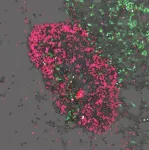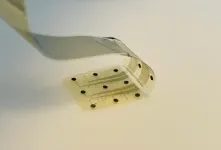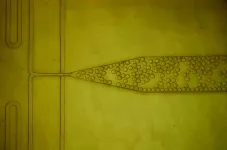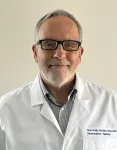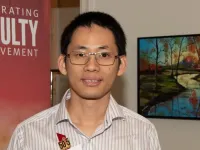(Press-News.org) An MUSC Hollings Cancer Center research team has created what team members believe to be among the first small molecules designed to stimulate immune cells to fight cancer. More importantly, these compounds inhibit a specific enzyme that hasn’t been targeted with small molecules for the treatment of cancer.
Small molecules are, quite literally, small. They’re hundreds of times smaller than monoclonal antibodies currently used in therapy, and they’re also structurally much simpler. Because of their low molecular mass, they are much more likely to enter cells. Aspirin, for example, is a small molecule drug.
The team from the lab of Hollings researcher Patrick Woster, Ph.D., describes its findings in a paper in RSC Chemical Science. Postdoctoral fellow Catherine Mills, Ph.D., said she wanted to look for potential new therapies for neuroblastoma, a serious and often fatal pediatric tumor. The resulting research project served as the subject of her doctoral dissertation. Mills explained that the small molecule the team created has the potential to one day be an adjuvant therapy, a therapy that boosts the effects of another treatment, for other cancers in addition to neuroblastoma.
“PD1 blockade has been massively successful in that patients who do respond, generally respond well,” she said. “But the problem is that such a small subset of patients respond. With a small molecule adjuvant agent, it may be that we can improve the scope of patients who are responding to therapy.”
There is also hope that this new small molecule could help to reduce resistance that can develop to monoclonal antibodies that eventually makes them ineffective. Patients with high-risk neuroblastomas are especially likely to find that their cancer becomes resistant to existing drugs.
There is increasing interest in developing small molecules for immune-based cancer treatments. Targeted therapies are often small molecules, but there are no approved small molecules for use in immunotherapy. In the past year, other investigators have developed small molecules designed to inhibit proteins that prevent the immune system from attacking cancer cells. The small molecule developed by the Hollings team inhibits the enzyme activity of CD38, an immunomodulating protein that can be found on natural killer (NK) immune cells as well as other types of immune cells.
Scientists have already created monoclonal antibodies that bind to CD38, which is especially high in cancers like multiple myeloma. These monoclonal antibodies bind to cancer cells with high levels of CD38, which cause them to be destroyed by the patient’s immune system. But CD38 has dual functions, Woster explained, and his team is targeting the second function, which is to make adenosine. Adenosine in high levels dampens the body’s immune response.
The team screened a publicly available library of compounds to look for small molecules with potential to target CD38’s enzyme activity. Upon identifying a candidate, the team then looked at its structural features and refined them to create a new compound that targets CD38 and stimulates the proliferation of NK cells.
“In the paper, we show that we can stimulate natural killer cells to multiply and thus more effectively attack and kill neuroblastoma,” Woster said.
Mills compared the compound’s action to a training montage in the movie “Rocky.”
“You take the immune cells, and they're in a state where they're just kind of hanging out, really not doing anything,” she said. “And you're basically giving them a personal trainer. By the end of this transformation, you should have pumped-up immune cells. They should be ready to go and really packing a punch in terms of anti-cancer activity.”
Woster said that working at an NCI-designated cancer center like Hollings has made a difference in his work because there is a culture of collaboration.
“I was very pleased to see how collaborative people are at Hollings. In the Cancer Center, there are other scientists and clinicians who have similar research interests. They perform techniques in their laboratories that we can use. We also have a great system of research cores here. My decision to move to MUSC allowed me to greatly expand our cancer research program,” he said.
Still, he cautioned that there is much work to be done.
“People really need to understand that you don't get an instant return from drug discovery. We are about as far from patients as you can get and still be in the process, but we are hopeful that these early steps will culminate in a new therapy for neuroblastoma and other cancers,” he said.
The team intends to make further refinements to the compound to make it more effective and easier to manufacture and to ensure it acts consistently. They’ll also continue to search for other similarly acting compounds, including compounds in the South Carolina Compound Collection at MUSC, to find candidates to target CD38.
“It is a long road, and there's a lot of other people who need to be involved,” Woster said. “So this is very promising early work, but it is very early.”
About MUSC Hollings Cancer Center
MUSC Hollings Cancer Center is South Carolina’s only National Cancer Institute-designated cancer center with the largest academic-based cancer research program in the state. The cancer center comprises more than 100 faculty cancer scientists and 20 academic departments. It has an annual research funding portfolio of more than $44 million and is dedicated to preventing and reducing the cancer burden across South Carolina. Hollings offers state-of-the-art diagnostic capabilities, therapies and surgical techniques within multidisciplinary clinics that include surgeons, medical oncologists, radiation therapists, radiologists, pathologists, psychologists and other specialists equipped for the full range of cancer care, including more than 200 clinical trials across South Carolina. For more information, visit hollingscancercenter.musc.edu.
END
Hollings researchers develop small molecule to stimulate natural killer cells against neuroblastoma
2023-02-28
ELSE PRESS RELEASES FROM THIS DATE:
'Informal carers’ experienced mental health decline ‘akin to divorce’ during COVID lockdowns
2023-02-28
People who became carers during Covid-19 by helping family members, friends or neighbours in need experienced a sharp decline in their own mental health, new research from Lancaster University reveals.
Using the General Health Questionnaire (GHQ) scale – a psychometrically validated and widely used index of psychological distress – researchers studied individual responses to the UK Household Longitudinal Study (Understanding Society).
They looked at 4698 participants from a total of 11 surveys - three before COVID-19 and eight collected between April 2020 ...
CU School of Medicine researchers part of national team that identified a new dietary approach to treatment for eosinophilic esophagitis
2023-02-28
Research by a team that includes two faculty members from the University of Colorado School of Medicine may change the treatment paradigm for patients with eosinophilic esophagitis (EoE), an allergic condition that causes chronic inflammation in the esophagus that can lead to esophageal narrowing and dysfunction.
Glenn Furuta, MD, professor of pediatric gastroenterology, hepatology, and nutrition, and Paul Menard-Katcher, MD, associate professor of gastroenterology, helped lead the National Institutes of Health (NIH)-funded, multisite study that shows that a single-food ...
New purification method could make protein drugs cheaper
2023-02-28
CAMBRIDGE, MA -- One of the most expensive steps in manufacturing protein drugs such as antibodies or insulin is the purification step: isolating the protein from the bioreactor used to produce it. This step can account for up to half of the total cost of manufacturing a protein.
In an effort to help reduce those costs, MIT engineers have devised a new way to perform this kind of purification. Their approach, which uses specialized nanoparticles to rapidly crystallize proteins, could help to make protein drugs more affordable and accessible, especially in developing ...
Graphene Flagship spin-off company INBRAIN Neuroelectronics wins prestigious innovation award
2023-02-28
INBRAIN Neuroelectronics, a Graphene Flagship spin-off company, has been named Spain’s most innovative company by leading Spanish news publication El Periódico.
INBRAIN exists to decode and modulate neural networks to improve patients’ lives. More specifically, INBRAIN is harnessing the unique properties of graphene to develop high density and high-resolution brain interfaces coupled to an intelligent system with high signal processing power to provide breakthrough neuroelectronic therapies.
The company was founded in 2020 by researchers from Graphene Flagship partner the Catalan Institute of Nanoscience ...
Henry Ford Medical Group appoints Dr. Brien J. Smith to top neurology role
2023-02-28
DETROIT (February 28, 2023) – The Henry Ford Medical Group today announced Brien J. Smith, M.D., MBA, a national expert in neurology and epilepsy, as its new Chair of the Department of Neurology.
In this leadership role, Dr. Smith will oversee all clinical, research and administrative services for the Department of Neurology at Henry Ford Health. A veteran of Henry Ford, Dr. Smith was previously part of Henry Ford Hospital’s Neurology Department for 18 years, serving as Director of the Epilepsy Monitoring Unit, Medical Director of the Comprehensive Epilepsy Program, and Director of the Clinical Neurophysiology Program at Henry Ford Hospital in Detroit. He ...
Responsive ankle exoskeleton algorithm handles changes in pace and gait
2023-02-28
Images
Ankle exoskeletons that can help people extend their endurance are a step closer to reality with a new control algorithm, developed at the University of Michigan, that could enable future exoskeletons to automatically adapt to individual users and tasks. This would reduce or eliminate the need for manual recalibration.
Current exoskeletons are limited because they must be tailored to a single user performing a single task, like walking in a straight line. Any changes require a lengthy set ...
Obesity makes it harder to diagnose and treat heart disease
2023-02-28
ROCHESTER, Minn. — Being overweight impacts your heart health in more ways than you might think. A new JACC review paper from Mayo Clinic outlines how obesity affects the common tests used to diagnose heart disease and impacts treatments. Cardiovascular disease is the leading cause of death in the U.S. and globally, yet it is largely preventable.
"Excess fat acts as a kind of filter and can skew test readings to under-or overdiagnosis," says senior author Francisco Lopez-Jimenez, M.D., director of preventive cardiology at Mayo Clinic. "Obesity affects ...
Shirley Ryan AbilityLab receives department of defense grant for first-of-its-kind study on neurally controlled bionic legs with osseointegration
2023-02-28
CHICAGO — Feb. 28, 2023 — Today, millions of individuals across the world live with limb loss, including thousands of combat-injured service men and women. Although significant progress has been made in the durability, control and function of prosthetic devices, they lack complete integration into the body.
Now, with the award of a $1.5 million grant from the Department of Defense Congressionally Directed Medical Research Program (CDMRP), Shirley Ryan AbilityLab — the top-ranked physical medicine and rehabilitation hospital — ...
BU researchers receive $1.3m EPA grant to advance climate resilience among Mystic River communities
2023-02-28
FOR IMMEDIATE RELEASE
February 28, 2023
Contact:
Jillian McKoy, jpmckoy@bu.edu
Michael Saunders, msaunder@bu.edu
##
BU Researchers Receive $1.3M EPA Grant to Advance Climate Resilience among Mystic River Communities
The three-year project aims to identify and address the cumulative impacts of chemical hazards and climate change that affect the 21 communities surrounding the Mystic River Watershed.
The 21 communities that surround Greater Boston’s Mystic River Watershed are exposed to many of the central threats of climate change, including urban heat islands and coastal and inland flooding, while also confronting multiple chemical exposures.
Now, with ...
Artificial intelligence with a human touch
2023-02-28
Despite the remarkable progress in artificial intelligence (AI), several studies show that AI systems do not improve radiologists' diagnostic performance. In fact, diagnostic errors contribute to 40,000 - 80,000 deaths annually in U.S. hospitals. This lapse creates a pressing need: Build next-generation computer-aided diagnosis algorithms that are more interactive to fully realize the benefits of AI in improving medical diagnosis.
That’s just what Hien Van Nguyen, University of Houston associate professor of electrical and computer engineering, is doing with a new $933,812 grant from the National Cancer Institute. He will focus on ...
